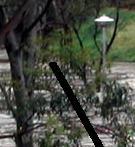Backslash
A backslash (uselesskeyus underenterus, from the Greek for back-leaning forest wanderer), also known in Japan as a ¥, is a wild animal that inhabits the forests of south-eastern Australia. It usually only comes out at night, to eat rats and journalists, but occasionally it can be seen during the day, if food is plentiful.
The offspring of the Backslash, also called Backslash, are occasionally taken from the mother by poachers when they are a few days old (a mother, on average, will have several thousand in her pouch) and sold to keyboard manufacturers. The baby Backslash is glued to the keyboard by a well-trained monkey who then gives the keyboard off to a Backslash handler, who will calm the baby Backslash down with kind words and harmful threats.
In the wild, Backslashs are very protective of their young, and will often sing "We Didn't Start The Fire" to repel would-be attackers.
Backslashs are typically known to be opposed to Slash in both musical tastes and political views.
Origins[edit]
Rumours of the Backslash date back to settler times in the early 19th-century, but it was only in 1841 that there was a confirmed sighting in central Victoria, just a few kilometres north of Daytona Beach, (although this was before the construction of Dr Michael Stipe's secret hideout). Edward Hargraves, searching for a quicker route to India, writes in his journal on the 14th of September:
"...After the small children had run off into the chasm, I heard a loud noise behind me, similar to a ringtone that my aunt had on her old phone. I noted that the noise was too loud to be made by man, and so I went a-hopping after it. I parted some branches from a low hanging tree and there I saw a thing, like a Backslash, feeding it's young.
Protection[edit]
Prior to 1985, the Backslash flourished in large numbers. Their herds stretched far across Australia, inhabiting the land from Western Australia to New South Wales and even parts of Victoria. When MS-DOS came out in the mid 80s the demand for Backslashes increased dramatically. This led to a sharp increase in price for wild backslashes and, as a result, their breeding grounds were trampled and their herds were pillaged by phishers hoping to make a quick profit. The number of wild Backslashes reached an estimated 250 in 1991, and their range decreased to an area in south-eastern Australia the size of Rhode Island.
The backslash is protected under the Local Animal Protection Act, created in 1992, known to Australia's media as the Backslash Protection Act. The Backslash are protected from local phishing and pharming practices, but interestingly enough not from overseas phishing and pharming acts.
Althought the Local Animal Protection Act of 1992, along with environmental conservation groups and government sponsored rehabilitation programs, helped raise the population of roaming backslashes to an estimated 2,000, the backslashes will probably never flourish in the numbers they did prior to the introduction of DOS.
Collective Noun[edit]
The collective noun is 'A Hindu God of Backslashes'
| Letters of the Alphabet: | |||||||||||||||||||||||||||||||||||||||||||||||||||||||||||
|---|---|---|---|---|---|---|---|---|---|---|---|---|---|---|---|---|---|---|---|---|---|---|---|---|---|---|---|---|---|---|---|---|---|---|---|---|---|---|---|---|---|---|---|---|---|---|---|---|---|---|---|---|---|---|---|---|---|---|---|
| Sleep | Web browser | Prev | Play | Stop | Next | Mute | Volume up | Volume down | CTRL-ALT-DEL | Launch Nuke | LOL! | Produced by N o b o d y c a r e s ® | |||||||||||||||||||||||||||||||||||||||||||||||
| Esc | empty space | TV | F1 | F2 | F3 | F4 | F5 | F6 | F7 | F8 | F9 | F10 | F11 | F12 | F13 | PrtSc SysRq |
ScLk | Pause Break |
Lose Weight | ||||||||||||||||||||||||||||||||||||||||
| ~ ` |
! 1 |
@ 2 |
£ 3 |
$ 4 |
% 5 |
^ 6 |
& 7 |
* 8 |
( 9 |
) 0 |
_ - |
+ = |
←Bkspc | Ins | Home | PgUp | Num | / | * | - | |||||||||||||||||||||||||||||||||||||||
| Tab↔ | Q | W | E | R | T | Y | U | I | O | P | { [ |
} ] |
| \ |
Del | End | PgDn | 7 | 8 | 9 | + | |||||||||||||||||||||||||||||||||||||||
| Caps | A | S | D | F | G | H | J | K | L | : ; |
" ' |
←Enter | Oh, SHIT! | Any | Duh | 4 | 5 | 6 | |||||||||||||||||||||||||||||||||||||||||
| ↑Shift | Z | X | C | V | B | N | M | < , |
> . |
? / |
↓Shift | ↑ | 1 | 2 | 3 | Ent | |||||||||||||||||||||||||||||||||||||||||||
| Ctrl | FN | Alt | s p a c e b a r | Alt Gr | ⌘ | Ctrl | ← | ↓ | → | 0 | . | ||||||||||||||||||||||||||||||||||||||||||||||||
